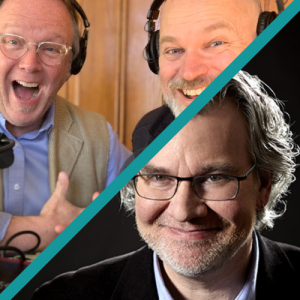
Stories, science and secrets from the world’s brightest thought-leaders. Behavioral Grooves is the podcast that satisfies your curiosity of why we do what we do. Explanations of human behavior that will improve your relationships, your wellbeing, and your organization by helping you find your groove.
Episodes

Sunday Jun 20, 2021
From Holding the Mic to Theory of Mind: Rob Leonard's Love of Language
Sunday Jun 20, 2021
Sunday Jun 20, 2021
Talk about a unique career path! From performing at Woodstock before Jimi Hendrix, with his band Sha Na Na, to now being a Forensic Linguist, testifying for infamous court cases, one theme runs throughout the life journey of our guest Rob Leonard; his love of language.
Rob Leonard started his unique career as a band member of Sha Na Na, one of only 32 bands who played at Woodstock in August of 1969. He played at the request of Jimi Hendrix and was the last band to go on to perform before Jimi went on to play one of his most memorable performances; the unforgettable rendition of the Star Spangled Banner.
Sha Na Na shot to fame when Rob was studying for his undergraduate degree at Columbia University. Since his commitment to the band’s rehearsals and performances was so time consuming, Rob chose to study the only language that had classes available on Saturdays: East African Bantu (also known as Swahili). So after graduating, and leaving the band, he spent 7 years in East Africa carrying out socio linguistic fieldwork, and subsequently earning his PhD.
Rob now practices as a forensic linguistics expert, analyzing the use of spoken and written language in a legal arena. He worked on the murder case of JonBenét Ramsey by analyzing the ransom note and testifying that it had not been written by the man who falsely confessed to her murder. Not only has he worked to solve cases in the US with the FBI, but he's also worked with Canada, and UK, law enforcement agencies as well. And he's worked on big corporate cases between Microsoft and Apple by carefully analyzing the way emails were written.
© 2021 Behavioral Grooves
Quotes From Our Conversation with Rob Leonard
(24:41) we can sort of use another metaphor, lift up the cover of the language and see what's going on underneath. And we can infer that there are certain patterns happening here that we then test for and we find
(26:09) “Most of the information that is transmitted in a conversation does not come from the words that a speaker says, they come from the mind of the listener.”
Topics we Discuss with Rob Leonard
(4:48) Speed Round
(6:08) Can you determine someone’s innocence from the way they speak?
(8:40) What is forensic linguistics?
(11:57) Non-random distribution of language
(13:21) Rob’s journey into learning East African Bantu
(19:18) How Rob found the career path into linguistics
(25:55) Theory of Mind
(34:12) Rob’s stories from playing at Woodstock
(47:40) Grooving Session about Rob
Links
Robert Leonard https://en.wikipedia.org/wiki/Robert_A._Leonard
“Sha Na Na and the Woodstock Generation,” by George Leonard '67 and Robert Leonard '70
http://www.georgeleonard.com/sha-na-na-and-the-woodstock-generation.htm
JonBenét Ramsey https://en.wikipedia.org/wiki/Death_of_JonBen%C3%A9t_Ramsey
Tammy A. Gales PhD https://www.hofstra.edu/faculty/fac_profiles.cfm?id=3587&t=/Academics/Colleges/HCLAS/CLL/
Andy Warhol https://en.wikipedia.org/wiki/Andy_Warhol
Episode 220: How Do You Become Influential? Jon Levy Reveals His Surprising Secrets https://behavioralgrooves.com/episode/how-to-be-influential-jon-levy/
Musical Links
Sha Na Na “Teen Angel” https://www.youtube.com/watch?v=pqN9n2FbuJE
Jimi Hendrix “The Star Spangled Banner” https://www.youtube.com/watch?v=TKAwPA14Ni4
Janis Joplin “Ball & Chain” https://www.youtube.com/watch?v=h66qXAK-q3o
Sha Na Na “Tears on my Pillow” https://www.youtube.com/watch?v=W3He_gyNG6A&ab_channel=Foofsmom
The Mamas and The Papas “California Dreamin’” https://www.youtube.com/watch?v=N-aK6JnyFmk&vl=en

Sunday Jun 13, 2021
Getting to Yes, And...Behavioral Grooves: Two Podcasts in One
Sunday Jun 13, 2021
Sunday Jun 13, 2021
This episode is a Behavioral Grooves first: we bring you our first ever joint podcast! Mid-way through the episode the tables turn and our guest interviews us! Our guest is the amazing Kelly Leonard, host of the great podcast called “Getting to Yes, And…” presented by Second City Works and WGN in Chicago. This unique conversation with Kelly, Kurt and Tim gives us a glimpse of the people behind the podcasts. It is a light-hearted, raw conversation scattered with some really personal, touching stories about challenges each of them have faced in their lives.
For over 30 years, Kelly has worked at Second City Improv - in all capacities moving up to Executive Vice President. He’s worked with some of the most unforgettable and influential comedians on the planet, such as Stephen Colbert, Tina Fey, Keegan Michael Key, Seth Meyers and Amy Poehler! His book, "Yes, And," received rave reviews in Vanity Fair and the Washington Post.
But what we really wanted to talk to Kelly about was his work as executive director of insights and applied improvisation at Second City. He now co-leads a new partnership with Booth School at the University of Chicago that studies behavioral science through the lens of improvisation. Their mission is to use humor and empathy, interactivity and dialogue, to elevate conversations and inspire people to perform better.
Kelly talks to us about what improv actually is. He believes it’s fundamentally different from comedy and says many people tell him that improv training changed their life. He likens improv to “yoga for your social skills”!
We discuss Kelly’s concept of “Yes, And”. So often as humans, our default setting when asked to be involved with something, is to do nothing or say no. But our regrets are almost always about the things that we didn't do. He describes saying “yes, and'' as a little nudge. And he has some innovative ways of sharing this idea through improv exercises
Kelly has discovered that real value is added to the “Yes, And” approach by adding a final step called “Thank You, Because”. Those are the words that help bridge a gap between us and someone else we fundamentally disagree with. By thanking someone for sharing information, their “fear brain” isn’t triggered, and they feel gratitude. The “Because” part forces us to find something in what they’ve said that is true for both of us. We then have some space to stay in the conversation together.
Our conversation with Kelly then flips! And for the first time ever on Behavioral Grooves, the interviewers become the interviewees! We delve into the behavioral science work that Tim and Kurt are passionate about; negativity bias and how to overcome it, talking to our emotions and naming our fears, the 4-Drive model of Motivation, as well as how to improve really dull work meetings!
Kurt and Tim tell us the “yes, and” story of how the Behavioral Grooves podcast actually started! And Kelly shares how an office fire was the spark that ignited his podcast journey. In this unique episode you will learn what makes these 3 great podcast hosts really tick and what techniques and exercises they use to stay positive, grateful and what they’ve learnt by saying “yes, and”.
Topics We Discuss in This Episode
(3:36) Welcome to Kelly and speed round questions
(5:00) What is improv?
(10:32) The concept of “Yes, And”
(17:15) Obstacles as gifts
(20:08) Growth mindset vs. fixed mindset
(21:46) “Wish” - a resilience exercise
(23:36) Kelly talks music
(26:56) Switch! Kelly welcomes Tim and Kurt
(27:09) Negativity Bias
(29:06) Talk to the emotions
(31:23) How writing connects with your emotions
(36:44) How Kurt started his business
(37:03) The 4-Drive Model of Motivation
(39:25) How Behavioral Grooves and Getting To Yes, And podcasts started
(42:18) Meetings suck! How can we improve them?
(44:29) Emotional safety at work
(52:30) Who do Kurt and Tim REALLY want as a guest on their podcast?
(59:42) Kurt and Tim’s Yes, And stories
(1:04:18) Grooving session
Links
Kelly Leonard: https://www.secondcity.com/people/kelly-leonard+
Second City: Secondcity.com
“Getting to Yes, And” Podcast: https://www.secondcityworks.com/podcast
Art In An Instant: The secrets of improvisation https://www.washingtonpost.com/graphics/2018/lifestyle/science-behind-improv-performance/
The Big Short Movie https://en.wikipedia.org/wiki/The_Big_Short_(film)
Richard Thaler https://en.wikipedia.org/wiki/Richard_Thaler
The Second Science Project https://www.secondcityworks.com/about/research-insights
Nicholas Epley “Mindwise: How We Understand What Others Think, Believe, Feel, and Want” https://amzn.to/34M4GRM
Tim Harford “Messy: The Power of Disorder to Transform Our Lives” https://amzn.to/34JN9dc
Kurt Nelson PhD, Communicating To Your Team During A Pandemic https://medium.com/@kurtnelson_84317/communicating-to-your-team-during-a-pandemic-insights-and-tips-for-leaders-rooted-in-behavioral-aebd938d0310
Devon Price PhD “Laziness Does Not Exist” https://amzn.to/3cqZl6Z
“Getting To Yes, And...podcast with Devon Price PhD” https://www.secondcityworks.com/podcast-posts/guest-dr-devon-price
Tim Houlihan “The Benefits Of Pre-industrial Revolution Life” https://www.behavioralchemy.com/news-1/2020/5/19/the-benefits-of-pre-industrial-revolution-life
David Byrne “American Utopia” https://americanutopiabroadway.com/
The 4-Drive Model. “Employee Motivation: A Powerful New Model”
https://hbr.org/2008/07/employee-motivation-a-powerful-new-model
Jane Dutton University of Michigan “Compassion at Work” https://core.ac.uk/download/pdf/145016032.pdf
Liz Fosslien “No Hard Feelings: Emotions at Work and How They Help Us Succeed” https://amzn.to/3v2LhXF
Episode 120: Covid-19 Crisis “Emotional Impact Of Wfh With Liz Fosslien” https://behavioralgrooves.com/episode/c-19-crisis-emotional-impact-of-wfh-with-liz-fosslien/
Kimberlé Crenshaw “Intersectionality” https://en.wikipedia.org/wiki/Intersectionality
Amy Edmondson “Psychological Safety” https://hbr.org/2021/04/what-psychological-safety-looks-like-in-a-hybrid-workplace
Adam Alter “Irresistible: The Rise of Addictive Technology and the Business of Keeping Us Hooked” https://amzn.to/3iuzAX0
Episode 204 “How Shellye Archambeau Flies Like an Eagle” https://behavioralgrooves.com/episode/shellye-archambeau-like-an-eagle/
Joann Lublin “Work-Life-Sway” https://www.mckinsey.com/featured-insights/mckinsey-on-books/author-talks-joann-lublin-on-lessons-for-working-mothers-their-families-and-their-employers#
Alan Alda https://aldacenter.org/
Daniel Kahneman https://en.wikipedia.org/wiki/Daniel_Kahneman
Barry Schwartz https://en.wikipedia.org/wiki/Barry_Schwartz_(psychologist)
David Byrne https://en.wikipedia.org/wiki/David_Byrne
Robert MacFarlane “The Lost Words” https://amzn.to/35dxmnj
Tina Seelig at Stanford University https://en.wikipedia.org/wiki/Tina_Seelig
Episode 67 “George Loewenstein: On a Functional Theory of Boredom” https://behavioralgrooves.com/episode/george-loewenstein-on-a-functional-theory-of-boredom/
John Sweeney https://bravenewworkshop.com/author/sweeney/
Katy Milkman “How to Change: The Science of Getting from Where You Are to Where You Want to Be” https://amzn.to/350WJbK
Episode 220 “How Do You Become Influential? Jon Levy Reveals His Surprising Secrets” https://behavioralgrooves.com/episode/how-to-be-influential-jon-levy/
Musical Links
Django Reinhardt “Three-Fingered Lightning” https://www.youtube.com/watch?v=PQhTpgicdx4
Keith Jarrett “If I Were A Bell” https://www.youtube.com/watch?v=Mr42YR4rHbE
Taylor Swift “Cardigan” from Folklore album https://www.youtube.com/watch?v=K-a8s8OLBSE
Taylor Swift “Willow” from Evermore album https://www.youtube.com/watch?v=RsEZmictANA
Lake Street Dive “Obviously” https://www.youtube.com/watch?v=q0XOy0XjKIg
Switched on Pop Podcast https://switchedonpop.com/
Neil Young “Harvest Moon” https://www.youtube.com/watch?v=n2MtEsrcTTs
David Bowie “Lazarus” https://www.youtube.com/watch?v=y-JqH1M4Ya8

Sunday Jun 06, 2021
Get More from Reading your Favorite Books with Pique founder Bec Weeks
Sunday Jun 06, 2021
Sunday Jun 06, 2021
On this episode of Behavioral Grooves we chat with the founder of the engaging new app PIQUE. Bec Weeks is a behavioral scientist turned accidental entrepreneur! By joining forces with some of the brightest minds in behavioral science, including partners Sendhil Mullainathan, Eldar Shafir and Mike Norton, they have developed an amazing app that accompanies your favorite books.
Pique takes users' interests in books to a new level with their slogan: Don't just read the book. DO the book. By using insights from psychology research, the app creates three-minute adventures that change how you see yourself and others. Pique helps you DO things. They know that just reading books doesn’t lead to change. Doing leads to change. That’s where the app can help.
Pique has created curious, engaging content from some of the bestselling books from the last year:
- Katy Milkman's new book “How to Change” https://amzn.to/2RSeJCj
- Lidy Klotz “Subtract: The Untapped Science of Less” https://amzn.to/3p6XcT0
- Annie Duke “How to Decide: Simple Tools for Making Better Choices” https://amzn.to/3yRPWyO
- And many more.
You can check out the new app Pique here: https://getpique.app.link/4voB1E9VOgb. But first, listen in to Bec's chat with us.
What You Will Learn About In This Episode
(2:38) Welcome and speed round
(5:06) What is Pique?
(12:50) Why humor is an important part of the app
(17:03) Why is the app called Pique?
(21:13) How Bec has used analytics and algorithmic techniques
(23:05) Bec’s journey to becoming an entrepreneur
(26:49) The surprises of being an entrepreneur
(32:43) How Bec first became interested in behavioral science
(34:37) What music would Bec take to a desert island?
(41:11) Grooving Session
I you are a regular listener to Behavioral Grooves, we would really appreciate your support by writing us a podcast review or becoming a Behavioral Grooves Patreon Member at https://www.patreon.com/behavioralgrooves. Thank you!
© 2021 Behavioral Grooves
Links
Bec Weeks: https://www.linkedin.com/in/becweeks/
Pique: https://getpique.app.link/4voB1E9VOgb
Sendhil Mullainathan and Eldar Shafir “Scarcity: Why Having Too Little Means So Much” https://amzn.to/3uzvyz2
Ashley Whillans “Time Smart: How to Reclaim Your Time and Live a Happier Life” https://amzn.to/3wSy4lD
Wendy Wood “Good Habits, Bad Habits: The Science of Making Positive Changes That Stick” https://amzn.to/2TzXxSr
Dolly Chugh “The Person You Mean to Be: How Good People Fight Bias” https://amzn.to/34BinTD
Katy Milkman “How to Change: The Science of Getting from Where You Are to Where You Want to Be” https://amzn.to/2RSeJCj
Annie Duke “How to Decide: Simple Tools for Making Better Choices” https://amzn.to/3yRPWyO
Lidy Klotz “Subtract: The Untapped Science of Less” https://amzn.to/3p6XcT0
Mike Norton and Elizabeth Dunn “Happy Money: The Science of Happier Spending” https://amzn.to/3c8Mlm1
Jennifer Aaker and Naomi Bagdonas “Humor, Seriously: Why Humor Is a Secret Weapon in Business and Life (And how anyone can harness it. Even you.)” https://amzn.to/3paWZhB
Daniel Kahneman “Thinking Fast and Slow” https://amzn.to/3fZDvbA
Episode 205: The Myth of the “Relationship Spark” with Logan Ury (featuring a guest appearance by Christina Gravert, PhD) https://behavioralgrooves.com/episode/the-myth-of-the-relationship-spark-with-logan-ury-featuring-a-guest-appearance-by-christina-gravert-phd/
Episode 220: How Do You Become Influential? Jon Levy Reveals His Surprising Secrets https://behavioralgrooves.com/episode/how-to-be-influential-jon-levy/
Episode 38: Linnea Gandhi: Crushing On Statistics https://behavioralgrooves.com/episode/linnea-gandhi-crushing-on-statistics/
Episode 224: Why Is Noise Worse Than Bias? Olivier Sibony Explains https://behavioralgrooves.com/episode/noise-with-olivier-sibony/
Deese–Roediger–McDermott paradigm (DRM): https://en.wikipedia.org/wiki/Deese%E2%80%93Roediger%E2%80%93McDermott_paradigm
Musical Links
Hamilton “Alexander Hamilton” https://www.youtube.com/watch?v=VhinPd5RRJw
Radiohead “No Surprises” https://www.youtube.com/watch?v=u5CVsCnxyXg
Taylor Swift “Love Story” https://www.youtube.com/watch?v=aXzVF3XeS8M
Dua Lipa “We’re Good” https://www.youtube.com/watch?v=jr47YisIsz8
Wicked “Defying Gravity” https://www.youtube.com/watch?v=glsmLGpqMzA
Frozen “The Next Fight Thing” https://www.youtube.com/watch?v=TuC_-7vy_F0
Moana “You’re Welcome” https://www.youtube.com/watch?v=79DijItQXMM
Billie Eilish “Your Power” https://www.youtube.com/watch?v=fzeWc3zh01g
Tame Impala “Let It Happen” https://www.youtube.com/watch?v=pFptt7Cargc
Powderfinger “These Days” https://www.youtube.com/watch?v=7XaSm9-r_4U&ab_channel=Powderfinger
Spiderbait “Black Betty” https://www.youtube.com/watch?v=nU1VfYYKMDk
The Cat Empire “Brighter Than Gold” https://www.youtube.com/watch?v=QM_rIaUm7ac

Sunday May 30, 2021
The Power of Unity: Robert Cialdini Expands His Best Selling Book Influence
Sunday May 30, 2021
Sunday May 30, 2021
The GodFather of Influence, Robert Cialdini joins us again on Behavioral Grooves to share his motivation for expanding his bestselling book Influence: The Psychology of Persuasion (https://amzn.to/3tyCpZ6) which now includes a completely new Seventh Principle of Influence: Unity. This additional principle can help explain our political loyalties, vaccine hesitancy and why media headlines can be so inflammatory.
Another motivation for the revised edition to the book is to include more application to the Principles of Influence. So our conversation highlights some of Bob’s advice for start-up businesses and how they can harness the principle of Social Proof. And as general advice, Bob recounts how he recently advised a teenager to be generous to others - this in turn stimulates the Rule of Reciprocity, nurturing a relationship which is mutually beneficial.
No episode of Behavioral Grooves would be complete without discussing music, even with guests we’ve interviewed before! But the theme of unity has a special significance with music and Bob highlights how music and dance bring people together and help them feel unified. Plus we get an interesting story of an experiment in France, and how a guitar case played a crucial part in one man’s luck.
We hope you enjoy our discussion with The Godfather of Influence, Robert Cialdini. Since we generously share our great content with you, perhaps you feel influenced by the Rule of Reciprocity and will become a Behavioral Grooves Patreon Member at https://www.patreon.com/behavioralgrooves!
© 2021 Behavioral Grooves
Topics we Discuss on Unity with Robert Cialdini
(3:55) Speed round
(6:50) Ideal number of stars on your online review
(9:00) Why Cialdini wrote a new edition of Influence
(12:13) The new Seventh Principle: Unity
(15:10) How to harness social proof as a start-up
(20:02) A new color of lies
(22:22) Principle of Unity with politics
(24:42) Tribalism and vaccine hesitancy
(28:35) Why Trump getting vaccinated hasn’t influenced his voters
(30:50) How framing of media headlines influences our perception of the news
(33:24) The Petrified Forest Wood Principle
(36:56) Where will the next generation of research go with Cialdini’s work?
(40:52) What advice would Cialdini give your teenager?
(48:23) Music and influence
(53:05) Grooving session
Robert Cialdini's Books
Influence, New and Expanded: The Psychology of Persuasion https://amzn.to/3tyCpZ6
Pre-Suasion: A Revolutionary Way to Influence and Persuade https://amzn.to/3eGdyOW
Links
Episode 50: Robert Cialdini, PhD: Littering, Egoism and Aretha Franklin https://behavioralgrooves.com/episode/robert-cialdini-phd-littering-egoism-and-aretha-franklin/
Increase Your Influence https://www.influenceatwork.com/
Godfather 2 Movie https://en.wikipedia.org/wiki/The_Godfather_Part_II
Richard Thaler https://en.wikipedia.org/wiki/Richard_Thaler
Daniel Kahneman https://en.wikipedia.org/wiki/Daniel_Kahneman
Episode 222: How Delusions Can Actually Be Useful: Shankar Vedantam Reveals How https://behavioralgrooves.com/episode/shankar-vedantam-useful-delusions/
Donald Trump vaccine https://www.forbes.com/sites/jackbrewster/2021/04/20/trump-i-dont-know-why-republicans-are-vaccine-hesitant-again-floats-pfizer-conspiracy-theory/
Petrified Forest Wood Principle https://www.psychologytoday.com/gb/blog/the-shaping-us/201909/the-petrified-wood-principle
Stanley Schachter https://en.wikipedia.org/wiki/Stanley_Schachter
Jerome Singer https://en.wikipedia.org/wiki/Jerome_E._Singer
Episode 220: How Do You Become Influential? Jon Levy Reveals His Surprising Secrets https://behavioralgrooves.com/episode/how-to-be-influential-jon-levy/
The psychology of misinformation: Why it’s so hard to correct: https://firstdraftnews.org/latest/the-psychology-of-misinformation-why-its-so-hard-to-correct/
How to combat fake news and misinformation: https://www.brookings.edu/research/how-to-combat-fake-news-and-disinformation/
Teaching skills to combat fake news and misinformation: https://www.washington.edu/trends/teaching-skills-to-combat-fake-news-and-misinformation/
Episode 102: Cristina Bicchieri: Social Norms are Bundles of Expectations https://behavioralgrooves.com/episode/cristina-bicchieri-social-norms-are-bundles-of-expectations/
Episode 214: Observing the Non-Obvious: How to Spot Trends Around You with Rohit Bhargava https://behavioralgrooves.com/episode/the-non-obvious-rohit-bhargava/
Behavioral Grooves Patreon https://www.patreon.com/behavioralgrooves

Wednesday May 26, 2021
Behind NOISE and Beyond The Book: Linnea Gandhi Shares her New Course on Noise
Wednesday May 26, 2021
Wednesday May 26, 2021
Linnea Gandhi is one of our favorite people to talk with and we had the pleasure of welcoming Linnea back to Behavioral Grooves recently. We last spoke to her in 2018 when she confessed to having a crush on statistics (a crush she clearly still harbors!) Since that time though, she has made a significant contribution to the infamous new book Noise: A Flaw in Human Judgment by Daniel Kahneman, Olivier Sibony and Cass Sunstein (https://amzn.to/3heyr5r). Linnea served as the chief of staff; project managing, researching and editing the groundbreaking work on the book. When we interviewed Olivier Sibony about Linnea’s contribution, he was glowing with compliments about her:
“it took someone as miraculously organized, helpful and smart, always positive and in a consistently cheerful, good mood. And I can't imagine anyone else on the planet who could have pulled this off, but Linnea did. So she's amazing.”
Linnea is a researcher, teacher, and practitioner of behavioral science in business settings. And she’s obsessed with error. Studying it, fixing it, and even embracing it – to enable better decisions by individuals and organizations.
Linnea is passionate about bridging the gap between behavioral science in academia and its application in the real world. She teaches decision science at the University of Chicago Booth School of Business, studies it as part of her PhD at the Wharton School of Business, and consults on it through her company, BehavioralSight (https://behavioralsight.teachable.com/). This foothold in both worlds, has given Linnea the expertise for her current project which sees her teaching the topic of noise in an “edu-tainment” online video course.
The tremendous new course (we got a sneak peak...it’s fantastic) is called Beyond Bias: How Noise May Be Drowning Out Your Decision Making Accuracy which is due to be published in June 2021. The course is purposefully designed for busy professionals who want to understand noise and how to mitigate it in organizations. Linnea and her team have meticulously planned the course videos so that they are short yet informative and entertaining. She is well aware that they are competing with Netflix for people’s attention!
Our conversation weaves in some endearing anecdotes about her personal experience of working with Kahneman, Sunstein and Sibony on the book. As well as some of the hurdles of working (and recording) from home that many of us can identify with from the last year. But Linnea’s passion for her work on noise and her enthusiasm for statistics is contagious. So much so that it has almost convinced Kurt to start reading about statistics in his spare time (almost!)
We hope you enjoy listening to Linnea’s work in behavioral science. At Behavioral Grooves, we are passionate about bringing you cutting edge interviews with the world’s best behavioral science practitioners, researchers and authors. If you would like to help support our work, please consider becoming a Behavioral Grooves Patreon at https://www.patreon.com/behavioralgrooves, we really appreciate the support.
© 2021 Behavioral Grooves
Topics We Discuss With Linnea
(3:07) Speed Round
(6:39) About Linnea’s new course on NOISE
(16:45) Why humans don’t see easily see randomness
(19:58) Working behind the scenes on NOISE
(22:48) How did the authors first collaborate on NOISE
(26:53) What finally convinced Linnea to get a PhD
(36:12) Decision Hygiene and Linnea’s favorite technique
(41:20) Music
(43:20) Grooving Session
Links
“Noise: A Flaw in Human Judgment” by Kahneman, Sibony and Sunstein, 2021 https://amzn.to/3heyr5r
Statistics As Principled Argument https://amzn.to/3uhRU8c
Linnea’s Video Course on Noise (coming in June 2021) “Beyond Bias: How Noise May Be Drowning Out Your Decision Making Accuracy” https://www.behavioralsight.com/online-learning
Episode 224: Why Is Noise Worse Than Bias? Olivier Sibony Explains https://behavioralgrooves.com/episode/noise-with-olivier-sibony/
Episode 38: Linnea Gandhi: Crushing On Statistics https://behavioralgrooves.com/episode/linnea-gandhi-crushing-on-statistics/
Daniel Kahneman https://amzn.to/2QQksId
Cass Sunstein https://amzn.to/3uj61Kp
Olivier Sibony https://amzn.to/3u8LBnp
Noise: How to Overcome the High, Hidden Cost of Inconsistent Decision Making https://hbr.org/2016/10/noise
Episode 176: Annie Duke on How to Decide https://behavioralgrooves.com/episode/annie-duke-on-how-to-decide/
Tania Lombrozo (Explanations) https://psych.princeton.edu/person/tania-lombrozo
Mona Lisa https://en.wikipedia.org/wiki/Mona_Lisa
A Structured Approach to Strategic Decisions https://sloanreview.mit.edu/article/a-structured-approach-to-strategic-decisions/
Duncan Watts https://en.wikipedia.org/wiki/Duncan_J._Watts
Angela Duckworth https://en.wikipedia.org/wiki/Angela_Duckworth
Episode 99: Katy Milkman: Behavior Change for Good https://behavioralgrooves.com/episode/behavior-change-for-good/
Barbara Mellers https://en.wikipedia.org/wiki/Barbara_Mellers
Maurice Schweitzer https://en.wikipedia.org/wiki/Maurice_Schweitzer
Richard E. Nisbett “Thinking: A Memoir” https://amzn.to/341F4A4
Pareidolia https://en.wikipedia.org/wiki/Pareidolia
Musical Links
Macklemore & Ryan Lewis “Thrift Shop” https://www.youtube.com/watch?v=QK8mJJJvaes&ab_channel=MacklemoreLLC

Sunday May 23, 2021
Why Is Noise Worse Than Bias? Olivier Sibony Explains
Sunday May 23, 2021
Sunday May 23, 2021
NOISE is set to be the next behavioral science bestseller. Daniel Kahneman, Cass Sunstein and Olivier Sibony describe noise as the unwanted variabilities in our judgments. In our exclusive interview with co-author Olivier Sibony (https://oliviersibony.com/about/) we delve into the fundamentals of noise. What different types of noise are there? Where do we find noise? Why does bias get more attention than noise? And finally, Olivier’s favorite topic; how we can mitigate noise by using decision hygiene and actively open minded thinking.
Olivier Sibony is a professor, writer and advisor specializing in the quality of strategic thinking and the design of decision processes. Olivier teaches Strategy, Decision Making and Problem Solving at HEC Paris. He is also an Associate Fellow of Saïd Business School in Oxford University. Olivier’s research centers on improving the quality of decision making by reducing the impact of behavioral biases. He is the author of numerous articles in academic and popular publications, including Before You Make That Big Decision, co-authored with Nobel Prize winner Daniel Kahneman.
Our interview with Olivier is, as I’m sure you will agree. absolutely mesmerizing. Learning about the extent of noise in our lives from Olivier and from the new book, is truly enlightening. As their cleverly crafted catchphrase says "wherever there is judgment, there is noise, and more of it than you think."
Thankfully, the brilliant team of authors have included lots of ways to combat the noise around us. And we know that our discussion with Olivier is just the first of many that we will have around this groundbreaking topic.
Behavioral Grooves strives to bring you insight and research from world-leading experts in behavioral science, like Olivier. And we do this without the use of paid advertising. If you would like to support our continued ad-free work, please consider becoming a Behavioral Grooves patreon by visiting https://www.patreon.com/behavioralgrooves thank you.
© 2021 Behavioral Grooves
Topics We Discuss
- (4:38) Welcome to Olivier Sibony and speed round questions
- (7:51) The difference between bias and noise
- (11:32) Why has bias received more attention than noise?
- (14:15) Where noise can be found?
- (22:32) What is Decision Hygiene?
- (26:35) How to implement mitigation techniques against noise?
- (29:32) Actively Open Minded Thinking and what it means for leadership and education
- (38:45) What are the different types of noise?
- (44:18) The role of moral philosophical foundations and noise
- (49:28) Music
- (54:06) Grooving Session and Bonus Track
Olivier Sibony’s Books
Noise: A Flaw in Human Judgment by Kahneman, Sibony and Sunstein, 2021 https://amzn.to/3heyr5r
You're About to Make a Terrible Mistake: How Biases Distort Decision-Making and What You Can Do to Fight Them https://amzn.to/3u8LBnp
Links
Olivier Sibony https://oliviersibony.com/about/
Languedoc wine https://en.wikipedia.org/wiki/Languedoc-Roussillon_wine
Rhones Valley wine https://en.wikipedia.org/wiki/Rh%C3%B4ne_wine
Dr Itiel Dror https://www.ucl.ac.uk/~ucjtidr/
Apgar Checklist https://www.acog.org/clinical/clinical-guidance/committee-opinion/articles/2015/10/the-apgar-score
John Maynard Keynes https://en.wikipedia.org/wiki/John_Maynard_Keynes
Max Bazerman “Better, Not Perfect: A Realist's Guide to Maximum Sustainable Goodness” https://amzn.to/3f4vvqm
Bentham's Utilitarianism https://en.wikipedia.org/wiki/Utilitarianism
Kant's Deontological Approach https://plato.stanford.edu/entries/ethics-deontological/
Noise: How to Overcome the High, Hidden Cost of Inconsistent Decision Making https://hbr.org/2016/10/noise
Behavioral Grooves Patreon https://www.patreon.com/behavioralgrooves
Musical Links
Yo-Yo Ma cellist “Bach Cello Suite No. 1 in G Major” https://www.youtube.com/watch?v=1prweT95Mo0
Billy Evans “My Foolish Heart” https://www.youtube.com/watch?v=a2LFVWBmoiw
Keith Garrett “I Grew Up Today” https://www.youtube.com/watch?v=0PerFVC6KbU
Oscar Peterson “C Jam Blues” https://www.youtube.com/watch?v=NTJhHn-TuDY
More Great Episodes Of Behavioral Grooves
Episode 220: How Do You Become Influential? Jon Levy Reveals His Surprising Secrets https://behavioralgrooves.com/episode/how-to-be-influential-jon-levy/
Episode 211: A Thousand Thanks: A Lifetime of Experiments and Gratitude with AJ Jacobs https://behavioralgrooves.com/episode/a-thousand-thanks-with-aj-jacobs/
Episode 204: How Shellye Archambeau Flies Like an Eagle https://behavioralgrooves.com/episode/shellye-archambeau-like-an-eagle/
Episode 176: Annie Duke on How to Decide https://behavioralgrooves.com/episode/annie-duke-on-how-to-decide/
Episode 147: Gary Latham, PhD: Goal Setting, Prompts, Priming, and Skepticism https://behavioralgrooves.com/episode/gary-latham-phd-goal-setting-prompts-priming-and-skepticism/
Episode 38: Linnea Gandhi: Crushing On Statistics https://behavioralgrooves.com/episode/linnea-gandhi-crushing-on-statistics/

Wednesday May 19, 2021
How Behavioral Science Can Impact Nonprofits: The Inspiring Story at Save The Children
Wednesday May 19, 2021
Wednesday May 19, 2021
Allison Zelkowitz seized the opportunity to use behavioral science at Save The Children to make a big impact on global projects. By building a world-first “nudge unit” within the organization, her story is an inspiring example of how application of behavioral science principles can make a real difference in the world.
Allison Zelkowitz is the Founder and Director of the Center for Utilizing Behavioral Insights for Children (CUBIC) https://www.savethechildren.net/cubic, part of the international nonprofit organization Save the Children. CUBIC is the first behavioural insights initiative or "nudge unit" in the world to focus on the most marginalised children’s rights and welfare. At CUBIC, they focus on nudging the behaviours and actions of decision-makers, educators, families and communities, so more children get the best possible start in life.
Ultimately, Allison is well aware that changing behavior isn’t about telling people what to do, it’s about facilitating ways for them to change: understanding the barriers and effectively removing them. The projects of CUBIC are not just inspiring, they are also life-saving. Projects such as
- Nudging children in Thailand to wear bicycle helmets,
- Encouraging breastfeeding in Laos, and
- Increasing playful teaching methods to enhance children’s learning in Bangladesh.
In our chat with Allison, she reveals the vast personal dedication that it took to enable CUBIC to be formed. We love that Allison first carved her interest in behavioral science by listening to podcasts in her spare time (Allison has since become a Behavioral Grooves Patreon https://www.patreon.com/behavioralgrooves - thank you for your support!) But within the space of 14 months, her idea had grown into an international collaboration with other leading behavioral scientists, a huge fundraising effort, and eventually to the global launch of CUBIC in April 2020.
In this episode you will learn:
- (11:05) What inspired Allison to start CUBIC at Save The Children International.
- (15:03) Why just giving people good information doesn't change their behavior.
- (19:45) An overview of setting up a Nudge unit.
- (23:55) The steps Allison took to build CUBIC in 14 months.
- (30:18) About the current project in the Philippines texting parents to encourage them to positively engage with their children.
- (41:54) Upcoming project on increasing vaccination uptake in the global south.
- (43:59) Music Allison enjoys.
- (48:58) Grooving Session and Bonus Track.
© 2021 Behavioral Grooves
Links
CUBIC - Save The Children International: https://www.savethechildren.net/cubic
Save The Children: https://www.savethechildren.org/?cid=Referral::POPUPwww.savethechildren.net::123199&utm_source=sciweb&utm_medium=web&utm_campaign=member_popup
CUBIC: Save The Children initiative: https://www.youtube.com/watch?v=BCy9B-k2044
Eliud Kipchoge: https://en.wikipedia.org/wiki/Eliud_Kipchoge
United States Parachute Association: https://uspa.org/
Allison's Blog on Skydiving with Behavioral Science: https://www.patreon.com/posts/behavioral-in-32008134
Behavioral Grooves Patreon: https://www.patreon.com/behavioralgrooves
Fadi Makki, Founder of Nudge Lebannon: https://nudgelebanon.org/our_team/fadi/
The Busara Center for Behavioral Economics: https://www.busaracenter.org/
Faisal Naru, OECD: https://www.oecd.org/gov/behavioural-insights.htm
Josh Martin, Ideas 42: https://www.ideas42.org/blog/incorporating-behavioral-science-cash-transfer-programs-changing-lives/
The Behavioral Insights Team: https://www.bi.team/
Dr Susanna Loeb, The Annenberg Institute, Brown University: https://annenberg.brown.edu/publications/one-step-time-effects-early-literacy-text-messaging-program-parents-preschoolers
The Lantern Group: https://lanterngroup.com/
Behavioral Alchemy: https://www.behavioralchemy.com/
Musical Links
Hamilton Soundtrack: https://www.youtube.com/playlist?list=PLV78EPlNCZ5B1vHkRicCAdpbDqZ1DpLgM
Journey “Don’t Stop Believing”: https://www.youtube.com/watch?v=1k8craCGpgs
Video for Allison’s wedding: https://www.youtube.com/watch?v=DD38az2cUsg
Other Episodes You Will Enjoy
Episode 202: How Chaning Jang Works Around Not Being WEIRD https://behavioralgrooves.com/episode/how-chaning-jang-works-around-not-being-weird/
Episode 209: GAABS and Improving the Future for Every Applied Behavioral Scientist https://behavioralgrooves.com/episode/improving-the-future-for-every-applied-behavioral-scientist/
Episode 190: Cornelia Walther on POZE: Pause, Observe, Zoom in, and Experience https://behavioralgrooves.com/episode/cornelia-walther-on-poze-pause-observe-zoom-in-and-experience/
Episode 168: The Stages of Grief, Pandemics and the Psychology of Protests with Nicole Fisher https://behavioralgrooves.com/episode/the-stages-of-grief-pandemics-and-the-psychology-of-protests-with-nicole-fisher/
Episode 165: Shlomi Ron: Visual Storying Telling In a Time of Crisis https://behavioralgrooves.com/episode/shlomi-ron-visual-storying-telling-in-a-time-of-crisis/
Episode 146: Covid-19 Crisis: Mariel Beasley on Increasing Short Term Savings During the Crisis https://behavioralgrooves.com/episode/covid-19-crisis-mariel-beasley-on-increasing-short-term-savings-during-the-crisis/
Episode 139: Iris Tzafrir: A Kind Word https://behavioralgrooves.com/episode/iris-tzafrir-a-kind-word/
Episode 73: Terry Esau: Carbon Fiber Therapist https://behavioralgrooves.com/episode/terry-esau-carbon-fiber-therapist/
Episode 19: The Teaspoon Hustle – Part 1 with Rob Burnet https://behavioralgrooves.com/episode/the-teaspoon-hustle-part-1-with-rob-burnett/
Episode 20: The Teaspoon Hustle – Part 2 with Rob Burnet https://behavioralgrooves.com/episode/the-teaspoon-hustle-part-2-with-rob-burnett/
Episode 221: Donating Our Money Is Irrational, So Why Do We Do It? Tim Kachuriak Explains Our Motivations https://behavioralgrooves.com/episode/why-we-donate-our-money/
Episode 1: Behavioral Grooves 1: James Heyman, Phd https://behavioralgrooves.com/episode/behavioral-grooves-1-james-heyman-phd/
Episode 222: How Delusions Can Actually Be Useful: Shankar Vedantam Reveals How https://behavioralgrooves.com/episode/shankar-vedantam-useful-delusions/

Sunday May 16, 2021
How Delusions Can Actually Be Useful: Shankar Vedantam Reveals How
Sunday May 16, 2021
Sunday May 16, 2021
In this episode, we are delighted to welcome Shankar Vedantam, host of the wildly popular podcast, Hidden Brain and esteemed author of the new book Useful Delusions (https://amzn.to/2PUkzlv).
Before reading Shankar’s book and interviewing him for this podcast we were, as Shankar describes himself, card-carrying rationalists. We were firmly in the camp of believing rational, scientific findings and believing that lies and deception are harmful to ourselves and to our communities. However, Shankar walks us through a compelling argument, that paradoxically, self-deception actually plays a pivotal role in our happiness and well-being.
In our discussion with Shankar we cover:
- (6:38) Speed round questions.
- (11:04) The difference between self delusions being useful and being harmful.
- (16:23) How nations are a delusional construct.
- (23:00) Awareness of self-delusions and how daily gratitudes can shift our perspective of the world.
- (25:56) Shankar’s personal story of delusional thinking.
- (29:58) The role emotions play in our mood and delusions.
- (35:23) How avoidance of delusional thinking is a sign of privilege.
- (37:30) Why our perceptions play an important role in understanding delusions.
- (44:36) Shankar’s unique approach to conspiracy theories.
- (52:28) What music Shankar has been listening to during COVID.
- (52:15) Grooving Session and Bonus Track with Kurt and Tim.
We really hope you find Shankar’s unique insight on how delusions are useful as compelling as we did. If you’re a regular Behavioral Grooves listener, please consider supporting us through Patreon (https://www.patreon.com/behavioralgrooves). Thank you!
© 2021 Behavioral Grooves
Books
- Useful Delusions: The Power and Paradox of the Self-Deceiving Brain https://amzn.to/2PUkzlv
- The Hidden Brain: How Our Unconscious Minds Elect Presidents, Control Markets, Wage Wars and Save Our Lives https://amzn.to/3e1qgWY
Links
Noise: A Flaw in Human Judgment by Kahneman, Sibony and Sunstein, 2021 https://amzn.to/3heyr5r
Richard Dawkins https://richarddawkins.net/
Mahabharata https://en.wikipedia.org/wiki/Mahabharata
Lake Wobegon Effect https://en.wikipedia.org/wiki/Lake_Wobegon
Other Episodes We Talk About
The Myth of the “Relationship Spark” with Logan Ury (featuring a guest appearance by Christina Gravert, PhD): https://behavioralgrooves.com/episode/the-myth-of-the-relationship-spark-with-logan-ury-featuring-a-guest-appearance-by-christina-gravert-phd/
Robert Cialdini, PhD: Littering, Egoism and Aretha Franklin: https://behavioralgrooves.com/episode/robert-cialdini-phd-littering-egoism-and-aretha-franklin/
Self Control, Belonging, and Why Your Most Dedicated Employees Are the Ones To Watch Out For with Roy Baumeister: https://behavioralgrooves.com/episode/self-control-belonging-and-why-your-most-dedicated-employees-are-the-ones-to-watch-out-for-with-roy-baumeister/
George Loewenstein: On a Functional Theory of Boredom: https://behavioralgrooves.com/episode/george-loewenstein-on-a-functional-theory-of-boredom/
Gary Latham, PhD: Goal Setting, Prompts, Priming, and Skepticism: https://behavioralgrooves.com/episode/gary-latham-phd-goal-setting-prompts-priming-and-skepticism/
John Bargh: Dante, Coffee and the Unconscious Mind: https://behavioralgrooves.com/episode/john-bargh-dante-coffee-and-the-unconscious-mind/
Linda Thunstrom: Are Thoughts and Prayers Empty Gestures to Suffering Disaster Victims? https://behavioralgrooves.com/episode/linda-thunstrom-are-thoughts-and-prayers-empty-gestures-to-suffering-disaster-victims/

Wednesday May 12, 2021
Wednesday May 12, 2021
Tim Kachuriak is the founder and Chief Innovation and Optimization Officer for NextAfter (https://www.nextafter.com/), a fundraising research lab and consulting firm that works with businesses, nonprofits, and NGOs to help them grow their resource capacity.
By his own admission, Tim is not a behavioral scientist, but what we love about Tim’s work is that he is using knowledge and research from the world of behavioral science and applying it to improve the efficiency of gift giving for nonprofit organizations. And not only does he use behavioral science techniques, he tests the theories in the nonprofit sector and generously publishes the findings on the NextAfter website (https://www.nextafter.com/research/).
In our conversation with Tim, he underscores the need for thinking about value proposition, a term widely used in the digital marketing world, but rarely thought of in terms of nonprofit organizations. He argues that potential donors are constantly weighing up the perceived value vs. the perceived cost of donating their money.
Tim also brings up the idea of reducing friction for donors: how can the giving experience be improved to make donating money a more seamless transaction. And we couldn’t help but see the parallels with the infamous new behavioral science book NOISE coming out later this month (Noise: A Flaw in Human Judgment (https://amzn.to/3heyr5r) by Kahneman, Sibony and Sunstein, 2021).
There are many reasons why we donate to nonprofits; emotional reward, belonging, anger, guilt (or as Tim positively reframes it - gratitude!). Understanding these motivations is a huge part of Tim’s work and why, as behavioral scientists, we are fascinated to understand the research he has conducted around donations.
Edit
Hey groovers, just wanted to let you know that somehow, at 29:28 mins of the podcast we ended up cutting Tim’s response to the Susan G Komen question and can’t find it on the cutting room floor…sorry about that.
What he answered was that it is important to look at the scale that these organizations work at and that sometimes spending 50% on marketing to raise a $100 million is more effective and can drive a larger change than only spending 10% on marketing, but only raising $10 million. We then went in and asked about how the pandemic has impacted giving.*
We hope you enjoy our discussion with Tim Kachuriak and if you are a regular Behavioral Grooves listener, perhaps you feel motivated to donate to our work by becoming a Behavioral Grooves Patreon Member (https://www.patreon.com/behavioralgrooves).
© 2021 Behavioral Grooves
Topics
(0:06) Introduction to our guest, Tim Kachuriak
(3:50) Speed Round Questions
(5:57) Why do People Give?
(9:41) The Principle of Reciprocity
(12:10) Effective Messaging and Value Proposition
(22:25) Reducing Friction
(34:48) Music
(40:27) Grooving Session
(58:44) Bonus Track
Links
NextAfter (https://www.nextafter.com/)
NextAfter Research To Grow Generosity (https://www.nextafter.com/research/)
Institute for Sustainable Philanthropy (https://www.philanthropy-institute.org.uk/)
Roger Dooley: Friction and Engagement (https://behavioralgrooves.com/episode/roger-dooley-friction-and-engagement/)
Susan G. Komen (https://www.komen.org/)
Dan Pallotta, TED - The Way We Think About Charity Is Dead Wrong (https://www.ted.com/talks/dan_pallotta_the_way_we_think_about_charity_is_dead_wrong?language=en)
John Hopkins University, Coronavirus Resource Centre (https://coronavirus.jhu.edu/)
Rotary Club (https://www.rotary.org/)
Salvation Army (https://www.salvationarmyusa.org/usn/)
Noise: A Flaw in Human Judgment (https://amzn.to/3heyr5r) by Kahneman, Sibony and Sunstein, 2021
Phish, Boardwalk Hall, Atlantic City on 10.30.2010 (https://phish.net/setlists/phish-october-30-2010-boardwalk-hall-atlantic-city-nj-usa.html)
Behavioral Grooves Patreon (https://www.patreon.com/behavioralgrooves)
Musical Links
Billy Joel “Scenes from An Italian Restaurant” (https://www.youtube.com/watch?v=Hxx8IWIvKg0)
Phish “Whole lotta love” (https://www.youtube.com/watch?v=x6XcIOGWUhY)
Other Episodes We Talk About
Robert Cialdini, PhD: Littering, Egoism and Aretha Franklin (https://behavioralgrooves.com/episode/robert-cialdini-phd-littering-egoism-and-aretha-franklin/)
Linda Thunstrom: Are Thoughts and Prayers Empty Gestures to Suffering Disaster Victims? (https://behavioralgrooves.com/episode/linda-thunstrom-are-thoughts-and-prayers-empty-gestures-to-suffering-disaster-victims/)

Sunday May 09, 2021
How Do You Become Influential? Jon Levy Reveals His Surprising Secrets
Sunday May 09, 2021
Sunday May 09, 2021
Our guest, Jon Levy, is arguably one of the most influential behavioral scientists in the world. Over 10 years ago, Jon founded The Influencers Dinner, a secret dining experience for industry leaders ranging from Olympians, Nobel laureates, executives, to musicians. Over the course of the last decade, these dinners have developed into a wide community of influential people.
Our opening speed round with Jon did not disappoint. We learn his unique perspective on which Star Trek Captains was the best, and the surprising answer to who his dream guest was at one of his dinners.
In our discussion with Jon, he shares the secrets behind his influential approach: what motivated him to start this novel idea, how he developed it and the key steps behind the ongoing success of the community that he has curated.
Jon’s second book, “You’re Invited: The Art and Science of Cultivating Influence” https://amzn.to/2RmlUlA is released on May 11, 2021. Which follows his hugely successful first book: “The 2 AM Principle: Discover the Science of Adventure” https://amzn.to/3eS3p0m. We had the privilege of previewing his latest book for this interview and we were blown away by Jon’s unique approach to cultivating human connections through trust and community.
Of course, we discuss what music Jon has been listening to at home and we are surprised to learn what has recently sparked his musical interest. Jon has found that through his Influence Dinners, he has hosted a lot of his childhood pop idols, which he still enjoys listening to.
Thanks for listening and thank you for taking a minute to join the others who have already left us a review.
© 2021 Behavioral Grooves
Jon Levy's Books
You're Invited: The Art and Science of Cultivating Influence https://amzn.to/2RmlUlA
The 2 AM Principle: Discover the Science of Adventure https://amzn.to/3eS3p0m
Links
Jon Levy https://www.jonlevytlb.com/
Peter Cullen (voice of Optimus Prime) https://en.wikipedia.org/wiki/Peter_Cullen
James T. Kirk https://en.wikipedia.org/wiki/James_T._Kirk
Jean-Luc Picard https://en.wikipedia.org/wiki/Jean-Luc_Picard
Neil deGrasse Tyson https://en.wikipedia.org/wiki/Neil_deGrasse_Tyson
Oprah https://en.wikipedia.org/wiki/Oprah_Winfrey
Beyonce https://en.wikipedia.org/wiki/Beyonc%C3%A9
Sir Richard Branson https://en.wikipedia.org/wiki/Richard_Branson
Stephen Hawking https://en.wikipedia.org/wiki/Stephen_Hawking
Disney https://www.disney.com/
Mark Zuckerberg https://en.wikipedia.org/wiki/Mark_Zuckerberg
Nicholas Christakis https://en.wikipedia.org/wiki/Nicholas_Christakis
James H. Fowler https://en.wikipedia.org/wiki/James_H._Fowler
The Spread of Obesity in a Large Social Network over 32 Years
Christakis and Fowler (2007) https://www.nejm.org/doi/full/10.1056/nejmsa066082
Nike Run Club https://www.nike.com/gb/nrc-app
Bill Nye the Science Guy https://billnye.com/
Parkour https://en.wikipedia.org/wiki/Parkour
The Daily Show https://en.wikipedia.org/wiki/The_Daily_Show
The New York Times: Want to Meet Influential New Yorkers? Invite Them to Dinner
SNVTA - Ventral tegmental area of the brain https://en.wikipedia.org/wiki/Ventral_tegmental_area
Davos https://en.wikipedia.org/wiki/Davos
Bill Gates https://en.wikipedia.org/wiki/Bill_Gates
Angela Merkel https://en.wikipedia.org/wiki/Angela_Merkel
My Octopus Teacher https://en.wikipedia.org/wiki/My_Octopus_Teacher
United States Navy SEAL selection and training https://en.wikipedia.org/wiki/United_States_Navy_SEAL_selection_and_training
The IKEA Effect https://en.wikipedia.org/wiki/IKEA_effect#:~:text=The%20IKEA%20effect%20is%20a,of%20furniture%20that%20require%20assembly
Common Biases & Heuristics https://docs.google.com/document/d/1XHpBr0VFcaT8wIUpr-9zMIb79dFMgOVFRxIZRybiftI/edit?usp=sharing
Brené Brown https://brenebrown.com/about/
Adam Grant https://www.adamgrant.net/
Behavioral Grooves Patreon https://www.patreon.com/behavioralgrooves
Musical Links
Bridgerton Soundtrack https://www.youtube.com/watch?v=rowHZd7-F1U&ab_channel=LoopedSongs
Vitamin String Quartet “Thank u, next” (Ariana Grande) https://www.youtube.com/watch?v=tmljfYBkGVg
John Williams “The Imperial March from The Empire Strikes Back” https://www.youtube.com/watch?v=u7HF4JG1pOg&list=PL2yW2adfehiV0-wSa784KIT1ZJ5_YEVjd&index=2&ab_channel=JohnWilliamsVEVO
Tribe Called Quest “Electric Relaxation“ https://www.youtube.com/watch?v=WHRnvjCkTsw&ab_channel=TribeCalledQuestVEVO
Biggie Smalls (The Notorious B.I.G.) “Big Poppa” https://www.youtube.com/watch?v=phaJXp_zMYM
Maroon Five “Sugar” https://www.youtube.com/watch?v=09R8_2nJtjg&ab_channel=Maroon5VEVO
98 Degrees “I Do (Cherish You)” https://www.youtube.com/watch?v=09R8_2nJtjg&ab_channel=Maroon5VEVO
Cowboy Junkies “Sweet Jane” https://www.youtube.com/watch?v=Fa9nN3G2CSg&t=173s
The Tragically Hip “Ahead by a Century” https://www.youtube.com/watch?v=QE2joQsWXJg
Topics
(4:46) Speed Round Questions
(9:03) Power vs Influence
(13:00) Why do we want influence?
(20:21) Jon discusses his new book
(25:41) Jon became influential
(32:11) How to create a community
(37:03) How trust is made and how to trigger it
(41:00) Music
(1:13:11) Bonus Track and Groove Idea
Other Episodes You’ll Enjoy
Dessa: The Attention Shepherd On The Curious Act Of Being Deeply Human (Episode 208) https://behavioralgrooves.com/episode/dessa-being-deeply-human/
Mapping the Influence of Corporate Cultures – Silke Brittain (Episode 12) https://behavioralgrooves.com/episode/mapping-the-influence-of-corporate-cultures-silke-brittain/
Robert Cialdini, PhD: Littering, Egoism and Aretha Franklin (Episode 50) https://behavioralgrooves.com/episode/robert-cialdini-phd-littering-egoism-and-aretha-franklin/
